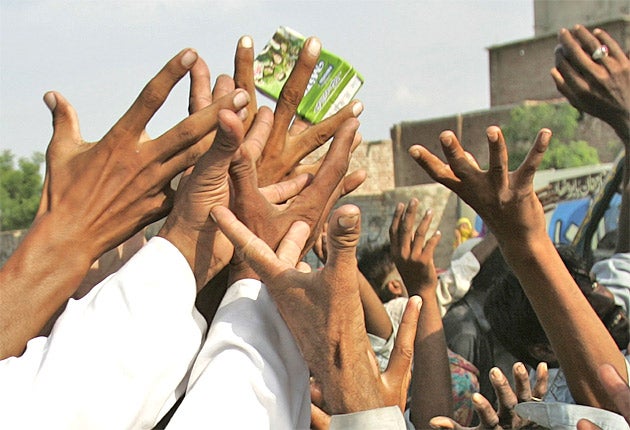Omar Waraich: This impoverished state can ill afford expensive borrowing

Your support helps us to tell the story
From reproductive rights to climate change to Big Tech, The Independent is on the ground when the story is developing. Whether it's investigating the financials of Elon Musk's pro-Trump PAC or producing our latest documentary, 'The A Word', which shines a light on the American women fighting for reproductive rights, we know how important it is to parse out the facts from the messaging.
At such a critical moment in US history, we need reporters on the ground. Your donation allows us to keep sending journalists to speak to both sides of the story.
The Independent is trusted by Americans across the entire political spectrum. And unlike many other quality news outlets, we choose not to lock Americans out of our reporting and analysis with paywalls. We believe quality journalism should be available to everyone, paid for by those who can afford it.
Your support makes all the difference.The decision to borrow $900m from the World Bank is an indignity that Pakistan is being forced to swallow. Foreign donors have been slow in marshalling aid to the country where weeks of unprecedented flood devastation have wrought billions of dollars worth of damage.
Yet, the impoverished Pakistani state, already close to ruin, can ill afford expensive borrowing that will add to its debt of $55.5bn. That figure is set to swell over the next couple of years as billions rescheduled after 9/11 are set to be recalled.
"The donors don't trust the government to come up with the money," said Akbar Zaidi, a leading economist. "The government can't really afford to take out such a large loan. But given the circumstances, it has no other option."
Even before the floods, Pakistan's fragile economic order was already strapped to a $11.3bn IMF support package, and senior officials admit the country is struggling to meet the Fund's exacting standards. The public finances have also been decimated by the cost of the fight against Islamist militancy which is thought to have eaten up $35bn over the last five years. As well as ravaging the local economy, the war on terror has scared away foreign direct investment.
Abdul Hafeez Sheikh, Pakistan's Finance Minister, is reluctant to put a figure on the scale of the economic damage caused by the floods. "The damage is colossal, it's still unfolding," he told The Independent. "It will run into billions and billions of dollars."
On top of the massive structural damage, Pakistan's agricultural economy, worth a quarter of its total economy will suffer setbacks for months to come.
Yet Pakistan boasts a wealthy industrial and landed elite, many of its big names routinely making it on to the Forbes rich lists. But among its chronic ailments is an embarrassingly narrow tax base. Many of the upper-middle classes and prominent politicians, including former prime ministers, pay little or no tax. A strong land-owning lobby has long resisted paying agricultural levies.
Redistribution efforts have been set back after Pervez Musharraf, the former president, lifted the "wealth tax". Now the government is poised to raise a national VAT, an income-regressive measure.
Meanwhile, the army remains a massive drain on the economy. While health and education only account for 1.5 per cent of the total budget, the most powerful institution in the country has long claimed at least 25 per cent of the country's budget.
Join our commenting forum
Join thought-provoking conversations, follow other Independent readers and see their replies
Comments